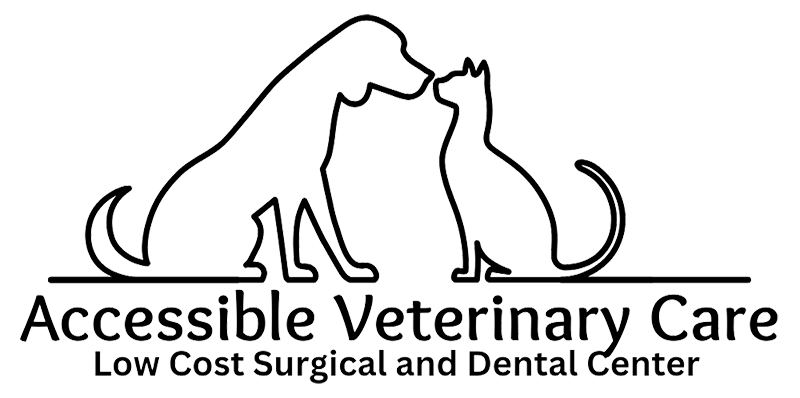Frequently Asked Questions
There is no question too big or too small for our veterinary team. Below are some answers to your most common questions.
We proudly serve the pets in Milton, FL, and beyond.
At Accessible Veterinary Care, we get a lot of interesting questions from pet parents. Below are some common FAQs that might help answer any questions or concerns. Please feel free to call us at 850-463-4242 for any other concerns you might have about your pet.
Do I have to prove financial need in order to utilize AVC for surgery or dental services for my pet?
No! AVC understands that the cost of veterinary care may prevent even the average pet owner from being able to pursue the life-changing or life-saving, surgical or dental procedures that their furry friend needs. For this reason, any dog or cat owner can utilize AVC.
How can you offer these procedures at such low costs?
At AVC, we do not aim to serve as your primary care veterinarian. Because we focus exclusively on performing a high volume of surgical procedures each day and do not offer general medical appointments, our veterinarians are highly experienced in surgery and dentistry. This expertise allows them to perform procedures efficiently, keeping anesthesia times shorter. As a result, AVC’s overhead costs are lower than those of a traditional veterinary practice.
Can I use you as my primary veterinarian?
The short answer is no. AVC was created as a way to increase access to surgical and dental procedures for dogs and cats in Northwest Florida and surrounding regions. By focusing on only these services, we can help more animals and pet owners per year and keep our costs lower. AVC is meant to serve as an adjunct, not an alternative, to having a relationship with a full-service veterinarian.
What services do you offer?
Please take a moment to review the services and pricing tab. We can perform most soft tissue surgeries as well as dental cleanings with or without extractions. If the procedure your pet needs is not listed on the website, please give us a call or send an email to see if we can help. Not every available procedure is listed.
How do I prepare my pet for their scheduled surgery?
For most routine or elective procedures, it is important that your pet not eat after midnight the night before the surgery. An empty stomach reduces the risk of potentially serious consequences of anesthesia, like regurgitation and aspiration. Water is typically allowed up until the time you drop off your pet. If your pet is on any medications, please make the care team aware and let them know when they last received a dose.
What happens on the day of my pet’s surgery?
You will bring your pet in on the morning of surgery to drop off between 7:30 and 8:00 AM. Since all pets are checking in at this time, be prepared for a bit of a wait. A team member will check you in and discuss whether all the information we have is correct. The veterinarian will do a pre-surgical examination while you are there to look for any abnormalities that may not have been recognized or that may pose a risk to your pet.
After this examination, your pet will receive a pre-medication to sedate and get pain control started before their surgery. Once your pet’s surgery has been completed and they are awake, they will be monitored by our medical staff until it is time to go home. All animals will be discharged same-day. No overnight care is available. Pick-up times may vary but typically Dogs will be discharged at 3:30 pm and Cats at 4:30 pm. You will be given written and verbal discharge instructions and sent home with pain medication. Your pet will likely remain somewhat sleepy for the remainder of the day/evening but should be feeling fairly normal the following day.
Why does my pet need a dental?
Unlike us, our furry friends do not often have a rigorous oral hygiene schedule. Daily brushing removes tartar deposited on our teeth and at the gum line, keeping our oral cavity fairly healthy. In comparison, most of our pets may only have their teeth brushed when being groomed, or never at all. Some foods, treats, and supplements can reduce tartar buildup (check out VOHC.org), but unless you are brushing your pet’s teeth every day, they are likely to develop some degree of dental disease. There are also some genetic and conformation components that can increase their likelihood of significant dental disease. Failure to manage dental and periodontal disease can lead to loss of teeth, loss of jaw bone, and jaw fractures.
Why should I do blood work on my pet before surgery?
Unfortunately, the external appearance of a human or animal may not be truly representative of their internal health. Blood panels are recommended before any anesthetic event to try to minimize the likelihood of any adverse events. Some abnormalities that may be caught on blood work include kidney dysfunction, liver dysfunction, anemia, lack of platelets or poor clotting ability, and abnormal inflammatory responses. Sometimes, this may prevent your pet from moving forward with surgery for their safety. In others, it may just alter our anesthetic protocol or post-op pain medication selection.
Blood work is required for certain procedures and all pets over 6 years of age.
Why should my pet get an IV catheter for surgery?
While the medications used and surgeries performed are generally considered safe, there is always a risk with any procedure. An IV catheter not only allows us to provide fluid therapy during surgery to maintain blood pressure during longer procedures, but also gives us quick and easy access to the bloodstream should your pet experience an emergency or adverse event.
An IV catheter is required for certain procedures as well as for pets over 6 years of age.
